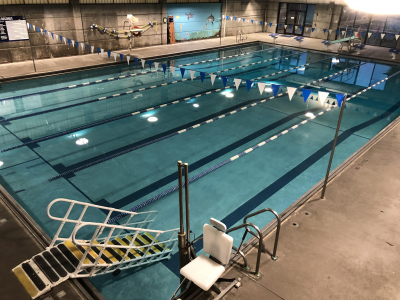Riverfront Community Center Pool Open Swim-Saturdays
Add to your calendar:
The Riverfront Community Center is available for open swim when Wollman Aquatic Center is closed. Stop at the front desk to pay the cashier and sign in, then join the fun on Fridays, Saturdays, and Sundays. Please review regulations below.
Open Swim Schedule (not during summer months)
- Friday - 6 p.m. to 7:30 p.m.
- Saturday - 1 p.m. to 4:30 p.m.
- Sunday - 2 p.m. to 4:30 p.m.
Open Swim Regulations
- Non-Swimmers under 48" tall must be accompanied by an adult (18 or older) in the water at all times or be able to pass a swim test. Children 10 and younger must be accompanied and directly supervised by a parent or adult guardian.
- U.S Coast Guard approved lifejackets are the ONLY flotation device allowed in our facility. Must have a visible stamp of U.S. Coast Guard.
- An adult or guardian must be within arm’s reach of any child who is considered a non-swimmer or a swimmer that requires a life jacket.
- Lifeguards reserve the right to administer swim tests as needed.
- Life jackets are not permitted in deep end of pool.
- Proper swim attire is required - no thongs, cut-offs, “sagging”, or suits with belts, buckles, rivets, etc.
- Swim diapers are mandatory for all non-toilet-trained swimmers.
- Showers are required before entering the swimming pool.
- No dunking, running, or rough play.
- Improper conduct or profane language will not be tolerated.
- No swinging on railings.
- No hanging on ropes or lap lanes.
- No diving except off the diving board.
- All food and drink must remain upstairs. Gum, glass containers, tobacco products, including vapes or e-cigarettes are not allowed in the facility.
- Persons under the influence of drugs or alcohol are prohibited from entering the pool area.
- Persons with communicable diseases, rashes, and skin, ear, or eye infections are not allowed in the water.
- No animals, except for service dogs, are allowed in the pool area.
- Leavenworth Parks and Recreation Department is not responsible for lost or stolen items.
- Lifeguards have the authority to enforce other rules as needed.
- Management reserves the right to refuse admittance to or eject from the premises any person failing to comply with these and other posted health and safety regulations.
- If you leave the pool area you must dry off completely and wear shoes in the building.
Inclement Weather/Lightning Policy
Lightning’s behavior is random and unpredictable. Preparedness and quick response are the best defenses towards a lightning hazard.
Swimming pools, both indoor and outdoor pools, are connected to a much larger surface area via underground water pipes, gas lines, electric and telephone wiring, etc. A lightning strike in one place to this metallic network may induce shocks elsewhere. When a body is in free-floating water, it is not part of any circuit path and cannot receive shocks. When a body in water is in contact with a circuit path, it will conduct current. This includes feet on the floor, touching the sides of the pool, touching ladders, underwater lights, railings, etc. Persons not in the water but inside the pool building may also become victims. Wet floors at pool facilities are very good conductors.
At the first signs of thunder or lightning, all pool activities will be suspended (including showers) until 30 minutes after the last observed thunder or lightning. Patrons should leave the pool and the surrounding area and seek shelter inside the main building. Staff will continue to monitor inclement weather; if conditions do not improve the pool will either have a delayed opening, closure for the day, or reopen when conditions are favorable.
Why only U.S. Coast Guard Approved Flotation Devices Allowed
Only U.S. Coast Guard-approved flotation devices are permitted in pools to ensure maximum safety and reliability for swimmers. These devices undergo rigorous testing to meet strict safety standards, guaranteeing that they provide sufficient buoyancy and stability in the water. Non-approved devices, such as inflatable toys or untested flotation aids, may not provide adequate support and can pose significant drowning risks. By using only U.S. Coast Guard-approved devices, pool facilities help protect swimmers, especially young children and inexperienced swimmers, from potential accidents.

